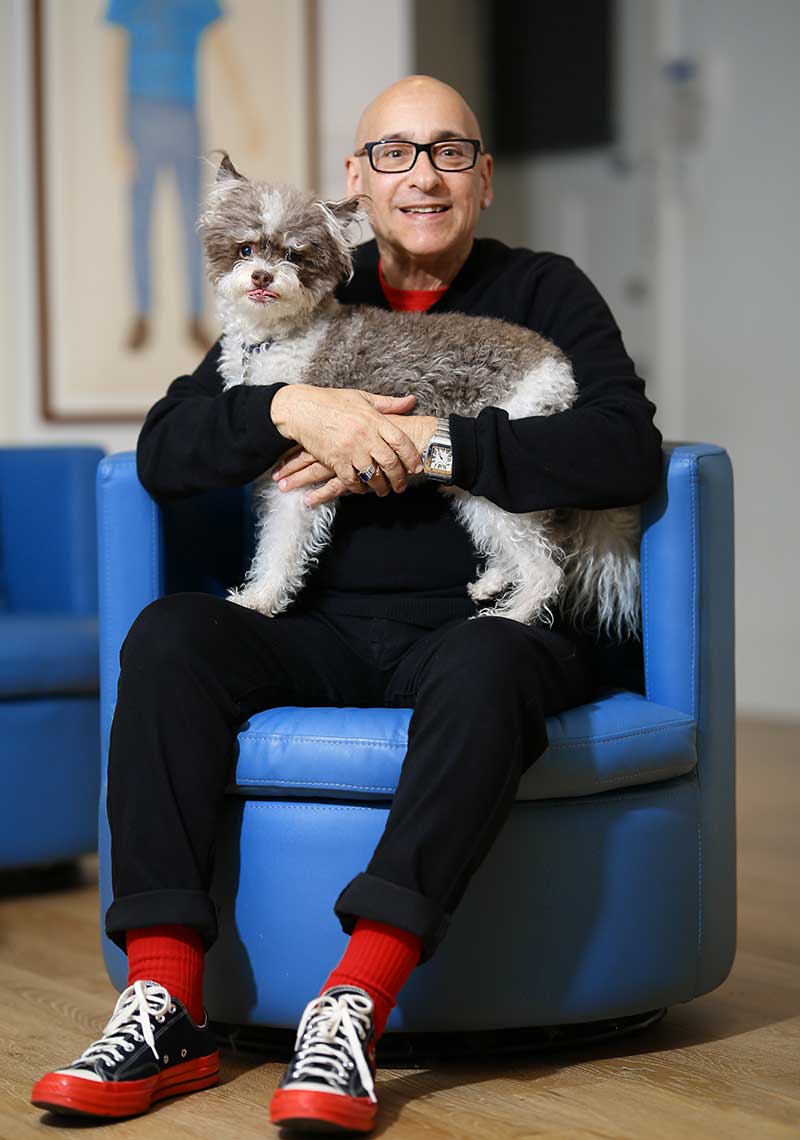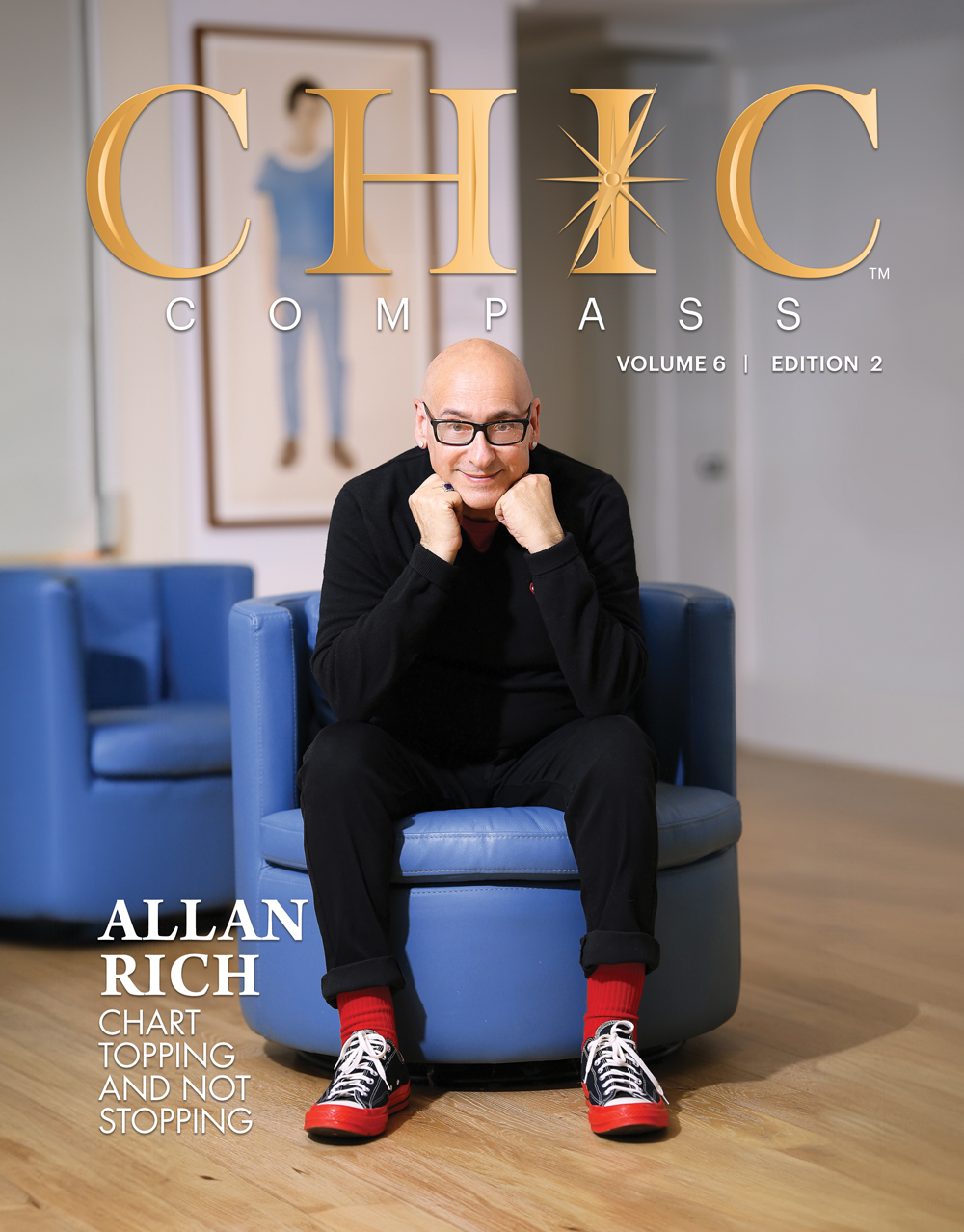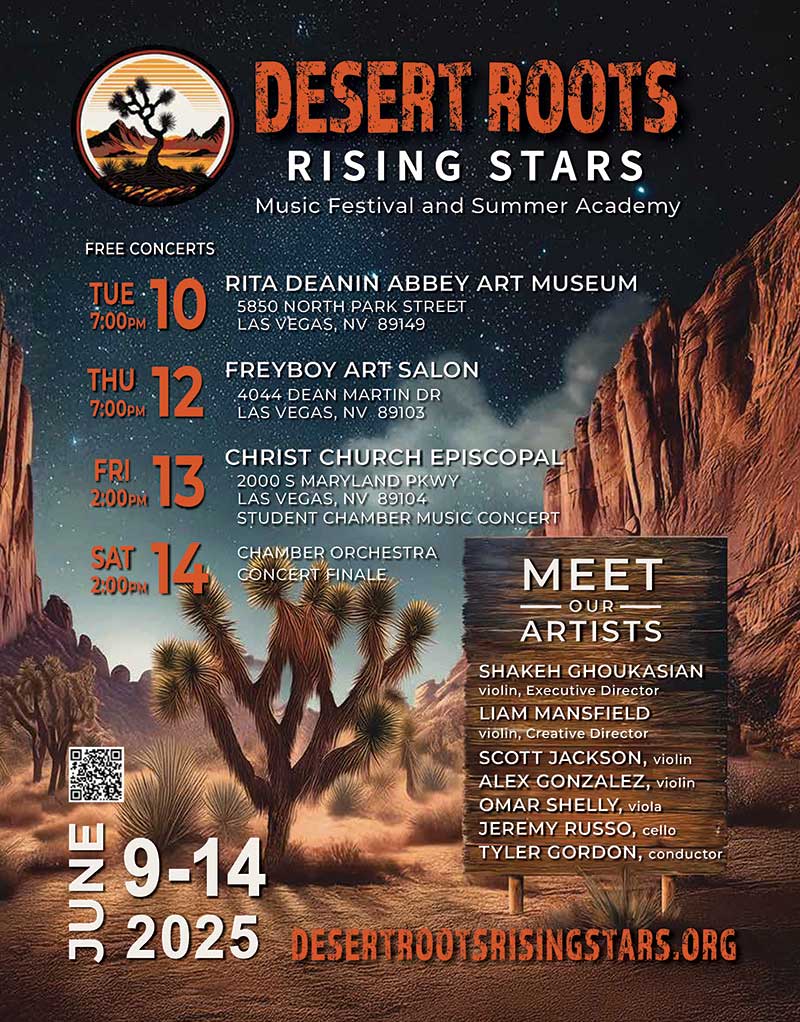
Photo of Allan Rich with his dog Charlie by Jaime Lim (Liquid Star Photography)
Allan Rich: Chart-Topping and Not Stopping
BY STACEY GUALANDI
“Besides watching Whitney Houston record Run to You, this is one of the greatest nights of our lives.”
With tears in his eyes, Allan Dennis Rich thanked the cheering crowd on behalf of himself and lifelong co-songwriter Jud J. Friedman.
“Our lives are flashing in front of us,” Rich says.
Both were the special guests at The Composers Showcase inside Myron’s at the Smith Center in downtown Las Vegas, where a powerhouse lineup of singers performed their greatest hits.
“I hope we can get through this song because both of us have been crying,” Friedman says before the duo performs their Dave Koz single That’s the Way I Feel About You.

Photo of Allan Rich standing beside Jud J. Friedman at The Composers Showcase by Jonathan Scott.
As prolific as this pair is when it comes to writing songs, they couldn’t have composed a better tribute to their phenomenal body of work.
“It’s an out-of-body experience, but we’re humbled and grateful,” Rich says.
The name Allan Dennis Rich might not ring a bell, but this songwriter’s colossal catalog of cuts will.
Rich is the two-time Oscar, Grammy, and Golden Globe-nominated songwriter behind such blockbusters as Whitney Houston’s Run to You from The Bodyguard to Natalie Cole’s I Live For Your Love to the No. 1 hit single I Don’t Have the Heart by James Ingram.
“Everybody always thinks the artist wrote the songs,” Rich jokes.
The A-list of names who have recorded his songs is endless: Barbra Streisand, Tina Turner, Rod Stewart, Luther Vandross, Dolly Parton, Barry Manilow, Ray Charles, Smokey Robinson, and Gladys Knight, just to name a few. Oh, and a little boy band named NSYNC.
“[In ‘97] my publisher said, ’We got a cut of I Drive Myself Crazy [co-written with Ellen Shipey and Rick Nowels] with this group NSYNC,’” Rich says, “I said, ‘Who are they?’ Ten million records later, I found out.”
At last count, Rich’s songs have sold almost 70 million copies!
“On one hand, I feel like I’ve succeeded beyond what I thought. On the other hand, I feel like I haven’t gone as far as I’m capable of,” Rich says.
The curators of the Hollywood Museum would beg to differ. Now featured prominently on the second floor of the historic Hollywood and Highland building is a spectacular glass-enclosed, floor-to-ceiling literal shrine devoted to the legendary lyricist.

Allan speaks with Stacey Gualandi with many of his award-winning and chart-topping titles on display. Photo by Jaime Lim (Liquid Star Photography)
It’s part of the museum’s PRIDE exhibit and features many famous faces he’s worked with, gold and platinum records, lyric sheets, photos, BMI awards, performance costumes, and more. When Rich and I met there for our interview, I quickly realized I was in the company of songwriting royalty.
“I am blessed, and I feel very privileged and humbled. I really do,” Rich says. “It’s one of the greatest moments of my life to be in a museum, but I’m just sorry that my parents didn’t get a chance to see it.”
Growing up in Brooklyn, Rich and his siblings, twin brother Lawrence and younger sister Nadeen, were raised on music appreciation.
“Every Sunday, my dad would make us breakfast, and then he would pull out the Victrola,” Rich says of dad Norman. “The first song I ever heard was Hush Now, Don’t Explain by Billie Holiday. Nothing excited him more than when he played his records for us.”
His mother, Evelyn, also spent endless hours teaching the twins song and dance routines they would perform from classroom to classroom. (Rich says their big hit was Side By Side/Oh, We Ain’t Got a Barrel of Money.)
“There’s no guarantees, but I knew I was going to do this since I was a little kid,” Rich says of someday being a music star. “I was called the ‘weeping one’ because I always sounded like I was crying when singing.”

Allan Rich with his twin brother Lawrence and sister, Nadeen.
At 18, Rich entered a contest to find the “Best New Talent in the Catskill Mountains.” He won the title for singing a medley with a “real live band” for the very first time in front of 1,000 people. His cautious parents quickly realized that he should pursue a music career.
In 1980, he moved to Hollywood and continued to struggle as a singer-turned-songwriter by selling shoes and, you guessed it…waiting tables. He worked at the celebrity-friendly The Source Restaurant on Sunset Boulevard, where his boss often told him he would never leave.
“I told him, ‘Like, hell, I’m not! I don’t know how I’m gonna do it, but I know I am,’” Rich says.
He served famous musicians like then-unknown Michael Feinstein, who was playing in piano bars; hit songwriters like Barry Mann and Steve Tyrell; and young stars like Steve Martin, Charlie Sheen, Tom Cruise, and even Muhammad Ali. He once told a customer in Booth #2, popular singer Syreeta Wright (who was once married to Stevie Wonder), that he, too, was a songwriter.

Allan Rich, Whitney Houston, David Foster, and Jud J. Friedman.
“After I moved to California, my dad came to me when I was 31,” Rich says. “He said, ‘Allan, I think you gave it your best shot, but I’m worried about your future. I think you need to think about getting a job and making a living.’”
“I was so crushed,” Rich admits. “But if I had listened to my father, I would’ve missed my big break one year later.”
That big break came in 1982 while on the Venice Beach boardwalk selling shoes—and his songwriting skills—to award-winning music producer Howie Rice.
Rice liked what he heard, and soon, the Brooklyn boy with the big dreams was co-writing songs for such iconic performers as Barry Manilow, Patti Labelle, and Gladys Knight. But it took another seven years before he had a bonafide pop hit with Natalie Cole called I Live For Your Love, co-written with Pam Reswick and Steve Werfel.
Then came a full circle moment for Rich. Remember that encounter he had with Syreeta Wright years before?
“Well, Syreeta and Smokey Robinson did a duet of a song I co-wrote,” Rich boasts of Love Brought Us Here Tonight. “I was invited to the recording session, and when I knocked on the door, Syreeta answered it. I asked, ‘Do you remember where you know me from?’”
She told him he looked familiar but couldn’t place the face.
“I said, ‘I was your waiter at The Source restaurant, and now I’m coming to watch you record my song with Smokey Robinson.’”
Rich says Syreeta screamed, wrapped her arms around him, gave him a big hug, and then signed his lyric sheets. She wrote, “Dear Allan, Remember: music will prevail.”
“It really is magic,” Rich says. “[A song] comes from connecting to a higher power and just being open to hearing what the universe has to say to you. I know it sounds airy fairy, but it’s not something tangible.”
Rich admits he is a conventional songwriter who likes to write conversations—with a little twist—that says something in a way you’ve never quite heard before. “In fact, if it’s not too crass, I call myself a ‘missionary position’ songwriter because I’m very traditional in the sense that I’m not a poet, and I don’t write stream of consciousness. It looks easy when you read it down the page, but making it look easy is very difficult.”
Little did Rich know that in 1989, when peermusic head Kathy Spanberger introduced him to fellow songwriter Jud J. Friedman, they would become writing partners for life and go on to make beautiful (and award-worthy) music together.
“The first song we ever wrote was number one in America,” Rich says of the James Ingram ballad I Don’t Have the Heart. “I think that’s the best song I’ve ever written in my life.”

Allan Rich with Jud J. Friedman at the BMI Awards.
The second song they wrote was the number one Adult Contemporary song I Just Had to Hear Your Voice by Oleta Adams in 1993.
“If that doesn’t tell you we were meant to be together…” Rich says of their over 30-year partnership. “When I’ve written a lyric, Jud would elevate it to make me look like a genius. That’s a rare thing to find in somebody, and I always say he’s my Burt Bacharach.”
Almost overnight, this talented twosome found their own voice. “There’s always a tearfulness and a tenderness in our songs,” Rich says. “Sometimes my lyrics look so simple on the page, but there is a magic in that simplicity, and sometimes I may need to take it up a notch, and Jud will always let me know—but always in a constructive way,”
Rich admits, “We all have to find our own process, and when I trust that process and don’t judge it, I succeed.”
In 1990, he didn’t know exactly why but trusted his instincts and turned down a European songwriting trip. Instead, he stayed home and wrote the first draft of the original lyric for Whitney Houston’s Run to You.
“I wrote it with Jud for Whitney, but the reality of the song is it coincided with a 10-year breakup in my own life,” Rich says. “I haven’t written many songs from real-life experiences…but I’m happy for the pain I’ve felt because it has helped me write some great songs.”
Run To You on The Bodyguard soundtrack went on to earn Rich and Friedman their first Academy and Grammy Award nominations. Rich says that, by far, the biggest highlight of his career was being nominated and becoming a member of the Academy.
Four years later, the dynamic duo writing team received another Oscar and Grammy nod, as well as a Golden Globe nomination for their 1997 Kenny Loggins ballad For the First Time co-written with legendary film scorer James Newton Howard for the movie One Fine Day starring Michelle Pfeiffer and George Clooney.

Photo of Allan Rich by Gene Reed
Rich was proud to have his family by his side at the Golden Globes and still laughs about how excited he was to wear a new burgundy velvet Nehru jacket he bought for the awards ceremony.
“I thought, ‘Oh my God, I love this jacket. It looks so different and so unique, and I felt like a million bucks.’”
But it didn’t take long for someone to burst his fashion bubble.
“I needed to go to the men’s room, so I was walking through the tables in the ballroom, and suddenly, I saw a hand raised and a finger snapping, ‘Waiter, more wine, please.’” Rich jokes, in retrospect. “I whispered, ‘I’m not your waiter; I’m a Golden Globe nominee!’”
(Rich got rid of the jacket the very next day.)
Writing a song for the one-and-only Barbra Streisand more than made up for any award show slight that same year.
Rich and his co-writers Dorothy Sea Gazeley and Marsha Malamet waited five years for Streisand to record the song Lessons to Be Learned.
“It’s one of my most beautiful songs we’ve ever written,” Rich says. “My favorite line in the song does tear me up because I wish I could live the line:
No matter how many times you stumble or fall
The greatest lesson is loving yourself through it all.
“That was a holy grail moment, and ever since, I’ve been trying to get a second song recorded by Barbra. It still hasn’t happened yet.” (He got to introduce his Jewish mother to Ms. Streisand at the Academy Awards, which he calls another career highlight.)
With so many writing credits and numerous chart-topping hits, Rich hopes his songs’ messages have helped move and touch people.
“If someone could hold onto that [message] and maybe not feel so bad, then I’ve done my job.”
Make no mistake. This chart-topping writer isn’t stopping. Rich believes there is still another big hit in his future.
“[Jud and I] were classic R&B/Pop balladeers, but getting a song to break through on the charts is very difficult today,” Rich laments. “I still feel I have so much I want to say.”

Photo of Allan Rich by Jaime Lim (Liquid Star Photography)
But Rich isn’t just resting on his lyrics. He is currently the executive producer of the documentary “Viva Verdi” about the Verdi Opera House in Italy, and he received a Daytime Emmy nomination as the co-executive producer (with his twin brother!) on Season 2 of the multiple Emmy Award-winning Kevin Spirtas/Michael Slade-scripted digital series “After Forever” on Prime.
This former singer now performs his songs on cruise ships and also mentors younger students at the Musicians Institute in Hollywood, giving honest advice from a career well-lived.
“You can be a songwriter for your whole life and still never break through, so you’re really taking a chance,” Rich admits. “Where I thought I fell short is I didn’t take the music business as seriously as a business as I should have.”
However, the ever-so-humble Rich certainly made his mark in the music industry, and he has gold and platinum records to prove it. He would make a copy for each one and send it to his parents, who would then hang them on the wall outside their bedroom.
“I said, ‘Dad, why did you put all the gold and platinum records on THAT wall?’”
“My father said, ‘So even when I’m sleeping, I could see them.’That, to me, was his way of saying he was proud of me.”
All it took was a five-year-old Jewish boy from Brooklyn listening to his father’s Victrola to leave such a rich musical legacy. Fortunately, his coda is still being written.



Awesome article about my long time good friend Allan Rich. Very deserved for someone so talented. Very proud of him and his incredible accomplishments!